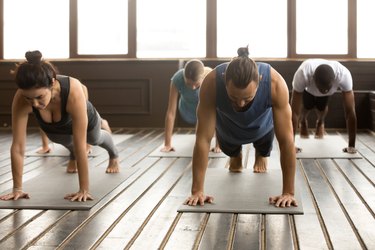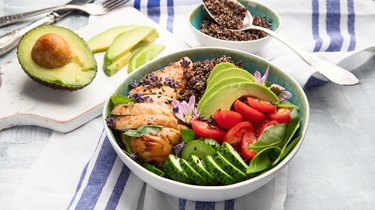
You've been hitting the gym, working your core and lifting weights — but you're still not getting those flat, defined abs that you've always wanted. What gives?
Many people want a tight core, but achieving that can be difficult. If you're looking to shed the layer of fat over your abs, the process actually involves much more than just targeting your midsection during workouts. Here, we tapped the experts to break it down.
Video of the Day
Video of the Day
Think Beyond Your Belly
The first thing you need to know is that you can't target fat loss from just your middle, says Lesley Bell, a certified personal trainer and brain health coach at the Pacific Neuroscience Institute at Providence Saint John's Health Center in Santa Monica, California. In other words, if you want to lose fat near your abs, you'll need to decrease fat across your entire body.
"A very common myth about strength training is referred to as 'spot reduction,' meaning if you work out one particular area of your body, the fat will melt off of that particular spot," she tells LIVESTRONG.com. "Unfortunately, that's not the way it works. Fat reduction is an overall process and is dependent upon how many calories one consumes and burns."
Your genetics also play a big role in how your body stores and distributes fat, according to a March 2014 review in Diabetologia. Women, for example, tend to store more subcutaneous fat and have more fat in their lower body. Women also have naturally higher levels of body fat than men, so it may be easier for a man to have visible abs than a woman.
Remember: There Are 2 Types of Belly Fat
If you're looking to lose fat, it's also important for you to understand the difference between the two major types of fat in the body. Your body actually has two different kinds of fat: visceral fat, sometimes called "hard" fat, and subcutaneous, or "soft" fat.
Bell explains that subcutaneous fat is the type of fat we can see and feel. It lies just under the skin and having some of it is necessary for survival. According to Bell, subcutaneous fat provides an extra layer of protection, which helps to regulate body temperature, create a barrier between skin and bone and serves as a storage sight for unused energy.
Visceral fat, on the other hand, lies deep in the abdomen, surrounding your organs, and poses a greater threat to your health. It releases hormones and inflammatory compounds called cytokines, which can increase the risk of heart disease, type 2 diabetes and high blood pressure, according to Harvard Health Publishing.

Eat Your Way to Better Abs
You've heard the phrase that abs are made in the kitchen, right? Well, there's a good reason for that. Although exercise is important for many reasons, including boosting your metabolism and maintaining a healthy heart, physical activity alone will not burn excess fat, especially over your abdominals.
Instead, the most effective way to lose body fat is to eat a healthy diet and have an overall calorie deficit to burn away extra fat.
"Any weight-loss plan will require a 'negative energy balance,' meaning you are burning more calories than you are eating," Kristi Veltkamp, RDN, a dietitian with Spectrum Health in Michigan, tells LIVESTRONG.com. "The best plan is one that can be followed long-term and allows for balanced nutrition that supports proper body function, like the Mediterranean diet."
Bell and Veltkamp also recommend nutrition strategies that will help your body optimize its fat-burning abilities and protect from future fat accumulation. For example, you can:
- Eat more fiber, healthy fats and protein. "By eating a well-balanced diet, your body will not only feel fuller longer, but will be receiving the nutrients it needs to avoid cravings and overeating that lead to the accumulation of fat," Bell says. Additionally, eating healthier fats can increase HDLs, which combat overall high cholesterol.
- Bring on the beans. "Beans are a great way to get in protein while cutting back on animal fats," says Veltkamp. "Beans also have fiber, minerals and phytonutrients." She recommends aiming for at least a half cup per day.
- Consume less trans fat, sugar and simple carbs. According to Bell, foods with added sugars and simple carbohydrates (think: sweets, soft drinks, cereal) cause a spike in your blood sugar, which will throw off your hormone balance and place unnecessary stress on the pancreas. Additionally, she says that trans fats (often found in foods with long shelf lives, like potato chips and packaged baked goods) have been linked to higher amounts of visceral fat.
- Drink less alcohol. "Alcohol has little-to-no nutritional value but still adds calories to our diet," Bell points out, so she recommends consuming less alcohol if fat loss is your goal. And because alcohol is dehydrating, alcoholic beverages will also slow down your metabolism and lead to an increase in overall fat. Sounds like a good reason to skip that hangover, right?
- Increase protein. Veltkamp explains that when you cut down on calories, your body starts to use protein and muscle for energy, so increasing your protein intake will help to prevent muscle loss. "Remember, we want to lose body fat," she says. "A lot of people lose muscle with severe diets and think they are doing well losing weight but are actually losing a lot of muscle."
Tip
If you're cutting calories for weight loss, your daily goal should be to get 1.3 grams of protein for every kilogram of body weight. Keep in mind that a kilogram equals 2.2 pounds — so a 180-pound person, for example, should try to eat about 106 grams of protein each day.
Up Your Fat Burn With Exercise
Reducing both visceral and subcutaneous fat depends on your lifestyle, Bell explains. And, she says, studies have shown that although they can decrease in size, fat cells don't decrease in numbers. In other words, you can shrink fat cells, but they never fully disappear. But the good news is that visceral fat responds well to both diet and exercise.
Bell recommends incorporating both aerobic training and strength training as a way to fight fat most effectively.
"Numerous studies have shown that a moderate amount of aerobic training is one of the most beneficial ways to reduce fat," she notes. And although the Physical Activity Guidelines for Americans recommend a minimum of 150 minutes of aerobic activity per week, she says that even starting with a short walk could make a difference in reducing the development of unwanted, dangerous fat.
Strength training, although not as effective at eliminating fat as aerobic training, Bell says, will also help your body to become more efficient at metabolizing both carbohydrates and fats. "Therefore, we reduce the risk of ailments such as obesity, diabetes and heart disease," she adds.
The Physical Activity Guidelines for Americans recommends strength training all your major muscle groups at least two days per week.

Strengthen Your Abdominal Muscles
Although you may not be able to spot-reduce fat on your abs, you can work on specific exercises that will help tighten your abs and build a stronger core. That way, when you do reduce fat from your body, you will have more defined abdominal muscles to display.
Read more: 10 Core-Strengthening Kettlebell Moves
Bell recommends the following four exercises as effective ways to strengthen your core:
Plank hold: Rise on your elbows and toes and ensure that your shoulders, hips and heels are all in a straight line. Tuck your chin so that your neck is in neutral spine and you are looking directly at the floor. Squeeze your quads, glutes and shoulders, then try to hold this position for at least one minute.
Ab wheel rollouts: Kneel on a mat with your feet uncrossed and toes on the ground. Using the ab wheel rollout, take a deep breath in and brace your core, moving the wheel away from your knees with slightly bent arms. Drop your chest as close to the ground as safely possible, then exhale, crunch and pull the ab wheel back toward your knees. Repeat.
Kneeling cable crunches: This weighted exercise allows you to contract most of your abdominals if done properly. Using a cable machine and a rope to hold onto, kneel on a mat directly below the handle. Choose your weight on the cable machine so that it feels fairly heavy, but achievable. While kneeling and holding the rope behind the head (next to the ears), take a deep breath in and elongate the spine so that the top of the head moves toward the ceiling, then exhale and crunch down toward your knees. Hold for two seconds, then slowly release back to neutral spine. Repeat.
Decline bench sit-ups: Lock your feet into the bench and lay back. Take a deep breath in, extending the arms overhead and lengthening the spine, then exhale and sit-up. Try not to round the spine, but instead stay nice and tall, reaching fingertips toward the ceiling. Lay back slowly and controlled, then repeat. If you can achieve this without weight, try to progress by holding a dumbbell or medicine ball.
While these exercises are great for building core strength, just keep in mind that core moves alone won't give you visible abs.
"Doing them does not necessarily mean you'll look like Zach Efron in the movies," Bell says. "You can have a strong core but not be able to see your abs due to them being buried under extra layers of fat."
Read more: The 41 Hardest Ab Exercises
Reduce Your Stress Levels to Lose More Fat
Along with physical activity and good nutrition, one way you can help shed excess fat in your body is to reduce your levels of stress. Yup, that's right. Although many of us think of being stressed as just a normal part of daily life, too much stress over long periods of time can actually lead to physical changes in the body that will increase your fat stores.
The visceral fat within your abdomen is significantly affected by stress levels. When you're stressed, your body releases cortisol, which Bell describes as the "stress hormone." Although cortisol release is a normal process on a short-term basis, if your cortisol levels stay high for an extended period of time, you will have more trouble losing fat and run into health problems.
"Cortisol increases when we are feeling overwhelmed in any way," Bell explains. "It is our bodies' natural response to both physical and psychological stress and its main goal is to preserve carbohydrates to use for more vital organs, such as the brain. If cortisol becomes too high, however, it can lead to symptoms such as overeating, depression and weight gain."

Read more: 8 Ways to Beat Stress-Induced Belly Fat
According to a February 2017 study published in Obesity, long-term cortisol exposure has a significant impact on fat accumulation in the body.
"Cortisol actually causes fat to be stored or taken from other areas of the body to be stored in the abdomen area," notes Veltkamp. "It also leads to more fat cell development and increases blood glucose and insulin suppression."
On top of all of that, elevated cortisol levels will increase your appetite and make you crave more energy-dense foods (read: high-calorie comfort foods), so you will feel hungrier and eat more too, Veltkamp adds.
All in all, stress = bad for your body, so it's important to reduce your stress levels for your overall health and especially if you are specifically trying to decrease fat in your body. To reduce stress, Bell recommends incorporating calming practices such as meditation, yoga or even just deep breathing throughout your day.
And don't overlook the importance of nutrition in helping you manage your stress. Veltkamp tells LIVESTRONG.com that what you eat can have a big impact on your stress levels. She suggests avoiding diets high in refined grains, sugars, red meats and fats and instead sticking to more fruits, vegetables, fish, legumes, nuts and whole grains, as those foods are associated with reduced depression and anxiety, according to October 2019 research in PLOS One.
You can also reduce your stress levels by trying some of the following science-backed methods:
- Declutter your environment. A September 2017 study in Current Psychology linked clutter to decreased life satisfaction in adults. Marie Kondo your space and breathe a little easier!
- Get outside. A June 2019 study in Scientific Reports found that spending at least 120 minutes a week outside in nature increases wellbeing and happiness.
- Decrease your time on social media. April 2015 research from Computers in Human Behavior revealed that there is a direct correlation between stressful experiences and Facebook usage.
- Get enough sleep. "Studies have proven that increasing your sleep from six hours or less per night to between seven and eight may help reduce visceral fat by approximately 26 percent," says Bell. "Anything less than that may cause an increase in abdominal weight gain." (Cortisol is the culprit here again, since your body tends to release the hormone when you're sleep-deprived.)
In the end, as Bell reminds us all, the only way to have visible, strong abs is to be very disciplined in your lifestyle, reduce your stress levels and pay close attention to the number of calories you consume and expend. Veltkamp also advises that to lose fat, you need to focus on the long term.
"Too many people look for the easy way out or quick fixes," Veltkamp notes. "The only thing that will make a long-term difference is making healthy changes that will last."
She adds that if what you are following cannot be maintained long-term — such as extreme diets — then your weight loss will not be long-term either.
"Lifestyle changes are not trendy, or always easy, but it's the only thing that really works," she says.
Ask Your Doctor About Surgery and Medications
Finally, if you're aiming to lose a lot of weight, talk to your health care provider about whether weight-loss surgery or medications may be a fit for you.
These options aren't right for everyone. But in conjunction with lifestyle changes, they can help some people lose weight and keep it off in the long run.
- Diabetologia: "The genetics of fat distribution"
- Obesity: "Hair cortisol and adiposity in a population‐based sample of 2,527 men and women aged 54 to 87 years"
- Current Psychology: "Delaying Disposing: Examining the Relationship between Procrastination and Clutter across Generations"
- Scientific Reports: "Spending at least 120 minutes a week in nature is associated with good health and wellbeing"
- Computers in Human Behavior: "The dark side of social networking sites: An exploration of the relational and psychological stressors associated with Facebook use and affordances"
- Office of Disease Prevention and Health Promotion: "Physical Activity Guidelines for Americans, 2nd Edition"
- PLOS One: "A brief diet intervention can reduce symptoms of depression in young adults – A randomised controlled trial"
- Harvard Health Publishing: "Abdominal fat and what to do about it"